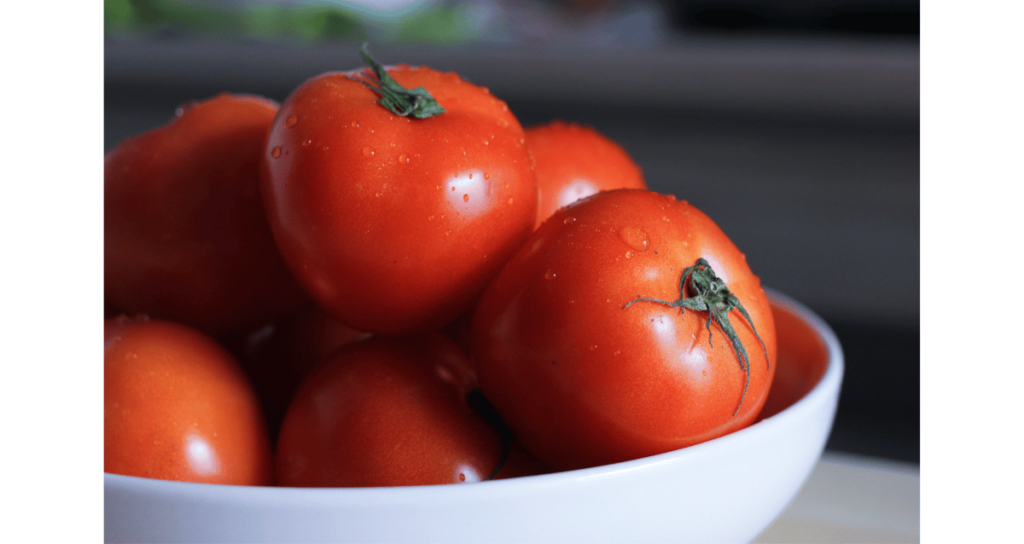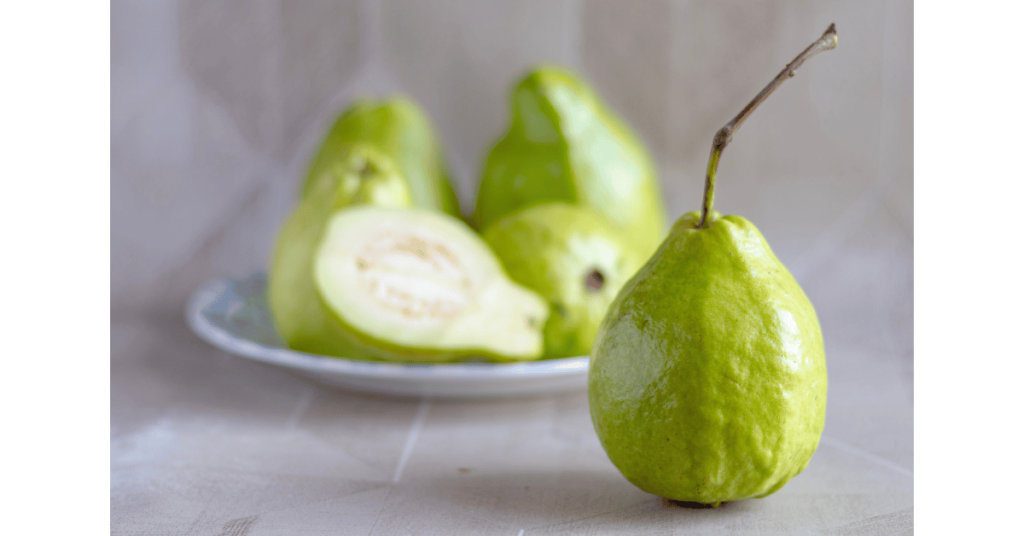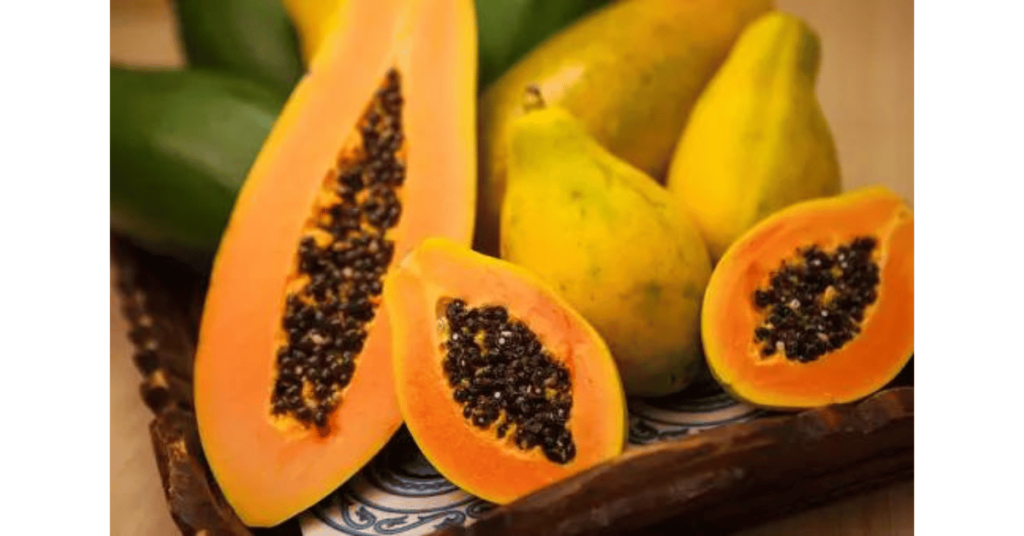Lycopene: Health Benefits and Foods High in Lycopene

Introduction
Have you ever wondered where the bright red colour of tomatoes and guavas comes from?
Lycopene is a red pigment. It is one of the dynamic anti-inflammatory oxidants found in some food sources. These foods include tomatoes, guavas, and watermelons.
Lycopene protects against many chronic conditions. Chronic conditions include cancer, heart disease, male infertility, and cognitive decline.
What is Lycopene?
Lycopene is an antioxidant. It fights free radicals in your body. If left unchecked, it can cause oxidative stress.
Lycopene is a member of the carotenoid family. Lycopene contributes to some fruits and vegetables’ red and orange colours. Lycopene is high in the antioxidant potential of all carotenoids.
Lycopene is also known as a non-provitamin A carotenoid. Your body is not able to convert it to vitamin A.
Lycopene benefits your health by protecting you from oxidative damage.
We find lycopene in the liver, testes, adrenal glands, and fatty tissues. There are lower kidney concentrations, ovaries, lungs, and prostate concentrations.
Your body cannot manufacture lycopene, and your source is plant foods. Lycopene only occurs in plants.
Lycopene Rich Foods
Foods high in lycopene are in a few fruits and veggies. Veggies like peppers and tomatoes are technically fruits. The following are the primary lycopene-rich foods you will find.
Tomatoes

The tomato, known as Lycopersicum esculentum, is lycopene’s most significant dietary source.
Approximately 80% of lycopene consumed globally comes from tomatoes and tomato products.
Nutrition Data estimates that one medium raw red tomato contains about 3 mg of lycopene. But, a cup of cooked red tomatoes has over twice that amount at about 7 mg.
Research found that there is no lycopene in green or yellow tomatoes. Yet, some varieties of purple tomatoes have lycopene.
Lycopene in tomatoes has many benefits. It has the potential to reduce the risk of certain malignancies. And some neuropathies, and type 2 diabetes.
Pesticides contaminate tomatoes. Get organic tomatoes or, like myself, plant and grow your own.
Guava

Guava, a tropical fruit, is another fruit filled with lycopene. Guava has the highest concentration of lycopene of any food.
A cup of raw guava supersedes even cooked tomatoes, giving 8.5 mg of lycopene. You can cook your guavas without any harmful effects. I like them plain with that tangy taste.
Watermelon

Unsplash/Floh Keitgen
The red in watermelon shows that it has lots of lycopene. Lycopene in watermelon is good for your body. One cup of diced watermelon contains far more lycopene than tomato.
Papaya

Unsplash/Pranjall Kumar
Papayas contain lycopene. A 100 gram has 2. 5 mg of lycopene.
Avoid bioengineered papayas. Always look at the labelling of your fruit.
Grapefruit

Pixabay/pixabay
Lycopene colours the food red. The pink and red grapefruits contain lycopene of approximately 4 mg.
Red Bell Peppers

Unsplash/Oudie 44
Amongst the foods high in lycopene is red bell peppers. They contain 0.01 to 0.5 mg per fruit.
Bioavailability of Lycopene
There is a need to understand the biochemistry behind lycopene. Like other carotenoids, lycopene is bioavailable from foods you consume.
Some fruits and vegetables have more nutrients when eaten raw. While lycopene-containing fruits thrive when cooked, dehydrated, and other processing methods.
These techniques lead to the release of carotenoids and result in easier use by the body.
Lycopene is fat-soluble rather than water-soluble. Thus, eating lycopene-containing foods with a fat source will benefit you. Serve cooked tomatoes with olives or avocado; it will be far better than eating tomatoes raw.
Lycopene Health Benefits

Pexels/Surgery in theatre
What does lycopene do to your body? Are there any health benefits of lycopene? The more we learn about lycopene, the more we learn about its health benefits. Following are a few of its best-documented positive effects.
Lycopene and Prostate Cancer
Several studies show that lycopene helps to prevent or suppress cancer.
Lycopene inhibits cell growth, keeping cancer cells from multiplying.
Lycopene fights oxidative injury by bolstering our natural cellular defence mechanisms.
It boosts glutathione levels, an important intracellular antioxidant. Lycopene also increases the activity of glutathione peroxidase. It also increases catalase, superoxide dismutase, and enzymes. These are critical components of cellular antioxidant defences.
Through these processes, lycopene may prevent the DNA damage that increases cancer risk. Lycopene also reduces the oxidation of lipids. Lipids play a role in developing atherosclerosis and cardiovascular disease.
Lycopene and Fertility in Man
One effect of high oxidation levels in the body is damage to sperm. Lycopene targets reactive oxygen species (ROS) to cut or prevent this effect. Thus helping to reduce DNA damage and sperm death. And it helps in the degradation of sperm cell membranes. Lycopene thus maintains healthy sperm motility, concentrations, and form.
Lycopene may Help Protect Against Peripheral Neuropathy.
Lycopene May Help Protect Against Peripheral Neuropathy
Bisphenol A (BPA) is an endocrine disruptor. You get it from the environment. It is also in plastic food cans, sporting goods, and appliances. Sometimes, you get it in eyeglass lenses and other equipment in the medical field.
BPA leaches from these items into the human body. BPA is a neurotoxin that harms your health and can impair cognitive function.
Research shows lycopene may protect the brain and the entire nervous system.
Lycopene Benefits for Skin Health
Lycopene promotes healthy skin and may also contribute to slowing the ageing process.
One of lycopene’s best antioxidant properties is to protect the skin from the sun. And also in other environmental damage. A perfect dietary inclusion in your food in sunny South Africa.
Lycopene and Heart Health
It helps in protecting against oxidative damage to the cardiovascular system.
Increasing your intake of lycopene can help reduce environmental toxins in your body. It may also reduce the risk of age-related disease.
Lycopene also helps lower LDL (“bad”) cholesterol. It also raises HDL (“good”) cholesterol to prevent plaque and atherosclerosis.
Lycopene and its Anti-inflammatory Effects
Inflammation is one root cause of many chronic disorders. Disorders include type 2 diabetes, Alzheimer’s, asthma, allergies, mood disorders, and arthritis. It turns out that lycopene consumption helps lower the potential of acquiring obesity and type 2 diabetes.
It fights inflammation in the liver, arterial cell walls, and fatty tissue.
The fighting of fatty tissue inflammation is significant. Much of the damage caused by obesity results from inflammatory compounds.
Compounds released by excess adipose cells. So, lycopene may be beneficial for anyone carrying significant extra weight.
Conclusion
Take your tomato juice, and don’t limit yourself to consuming lycopene-rich foods.

1 thought on “Lycopene: Health Benefits and Foods High in Lycopene”